(精心整理)小学英语四大时态总结(附小升初时态考题)
【译林版专用】小升初英语语法复习讲义——四大时态(含答案)

小升初寒假专题-------- 四大时态辨析知识点梳理一般现在时用法A. 区分祈使句和一般现在时句型(Eg: 祈使句:Bobby, don’t be sad. 一般现在时:Bobby isn’t sad.)B. 自然规律。
(Eg: the earth goes around the sun.)C. 主语和with词组并列时,遵循就远原则。
(Eg:She with her friends goes swimming every day.)D. 按照计划,规定或者时间表行事。
(The plane takes off at 6 p. m.)E. 当主语是who; which; what等;将其看成第三人称单数。
(Who makes the room messy?)注意:一般现在时中的频率副词可分为模糊频率副词和精确频率副词模糊频率副词:always; usually; often; seldom; hardly; never精确频率副词:twice a week; once a week; three times a week对频率副词提问: How often对次数提问:How many times时间状语1. every 系列2. 频率副词3. On Sundays(表示每一个星期日)基本句型肯定句:主语+ 动词(注意第三人称单数)+ 其他否定句:主语+ don’t / doesn’t动词原形+ 其他(注意:当动词是do时,否定句一定是doesn’t do / don’t do)一般疑问句:Does/ Do + 主语+ 动词原形+ 其他?特殊疑问句:特殊疑问词+ 一般疑问句(Does/ Do + 主语+ 动词原形+ 其他?)现在进行时A. 表示这一阶段正在进行的动作。
(标志词:these days)We are preparing for the coming exams these days.B. 一些动词没有现在进行时。
小学英语时态总结及练习题终版【精】

四大时态总结及练习你知道时态是什么意思吗?时态代表什么吗?小学英语就四个时态,你掌握了吗?时态用法例句时间状语一般现在时1、表示事物或人物的特征、状态。
2、表示经常性或习惯性的动作。
3.表示客观现实。
主语是三单:Theskyisblue.Hegetsupatsixeveryday.主语非三单:Theballoonsareblue.Igetupatsixeveryday.often一般过去时表示过去某个时间发生的动作或存在的状态。
Wereyouatschooljustnow?WhatdidJimdoyesterday?yesterday一般将来时1、表示将要发生的动作或存在的状态。
2及打算、计划或准备做某事。
Iwillgotoschooltomorrow.I’mgoingtohaveapicnicthisafternoon.tomorrow现在进行时现在进行时表示现在正在进行或发生的动作。
Areyousleeping?Whatareyoudoing?now时态动词变形名称动词变形规则各举一例一般现在时主语为第三人称单数时,动词变三单1. 一般情况下2. sh,ch,s,x,o结尾3. 结尾是辅音字母加y4.不规则动词havecookwashdostudy一般过去时动词变过去式 1. 一般情况下2. 动词结尾是e3. 重读闭音节辅元辅结构4. 结尾是辅音字母加y5. 不规则动词pulltastestopstudybe,see,get等等一般将来时begoingto+ will+现在进行时动词变动名词 1. 一般情况下2. 以不发音字母e结尾的动词3.重读闭音节辅元辅结构cookmakerun,swim英语语法中的时态(tense)是一种动词形式,不同的时态用以表示不同的时间与方式。
是表示行为、动作、状态在各种时间条件下的动词形式多加练习,百战不殆之时态一、选择最佳的答案:1.____Aliceoftenplaythepiano?No,she_____.A.Do;doB.Does;doesC.Does;doesn't2.___yourpenpal__inBeijing?A.Do;liveB.Do;livesC.Does;live3.TomandMike__veryexcited,theywilltakeatrip.A.isB.areC.am4.Ilike________verymuch.Whataboutyou?A.danceB.dancedC.dancing5.Thekite____abird.A.looklikeB.islookingC.lookslike6.BillandI___goodfriends.A.isB.areC.am7.Sandyoften___hishomeworkonSundays.A.doB.doesC.did8.Whatdoyouusuallydoontheweekend?I__________.A.wentswimmingB.goswimmingC.visitedgrandparents9.Whatdoyouusuallydoonyourholiday?Iusually__________.A.sawelephantsB.singanddanceC.tookpicture10.I____astudent.Igotoschool____buseveryday.A.is;byB.am;onC.am;by11.I____abrother.She____asister.A.have;hasB.has;hasC.have;have12.You____astudent.He____ateacher.A.is;isB.are;isC.are;are13.Healways_____footballgames.A.watchesB.watchC.doesn't14.Mybestfriend_____shells.A.collectsB.collectC.often15.Shedoesn’t_____listeningtothemusic.A.oftenB.likeC.likes16.MymotherandI___alwayswatchromanticfilms.A.doesn’tB.don’tC.do17.---When_____heusuallygethomeonFriday?----HeusuallygetshomeatfouronFriday.A.doB.doesC.did18,.Summer_________spring.esafteresinesbefore19.Everyone____totheirteacherintheclassroom.A.arelisteningB.islisteningC.listen20.Theyaresingingand___togetheratthepartynow.A.danceB.dancedC.dancing21.Listen!Thebirds____.A.issingingB.aresingC.aresinging22.Look!Thekite___inthesky.A.flyB.fliesC.isflying23.They____ridingaforse.A.isB.areC.am24.Kate____playingchess.A.amB.isC.are25.Areyouwashingclothes?A.Yes,youareB.Yes,IamC.No,Iam26.Ishe____TV?Yes,heis.A.watchB.watchingC.not27.____theytakingpictures.?Yes,theyare.A.AmB.BeC.Are28.It’s10o’clock.Ben_____TVinthebedroom.A.watchB.iswatchingC.watches29.I___presentsformyparentsyesterday.A.buyedB.boughtC.buying30.Susan_____swimmingyesterday.A.goB.goesC.went31.Danny_____breakfastfivetimeslastweek.A.eatB.ateC.eatedstSunday____TreePlantingDay.A.isB.wereC.was33.I____alotfromourtextbook.A.learnedB.learnesC.learning34.We____tothezooand___alotofanimalsyesterday.A.go;seeB.went;sawC.goes;sees35.Whatdidyoudolastweekend?--I_________A.readabookB.washtheclothesC.gofishing36.Whatdidyoudoonyourholiday?I________A.boughtapresentB.goskiingC.learnEnglish37.Whatdidhe_____yesterday?He____hishomework.A.did;didB.do;didC.do;do38.YesterdaymypresentsandI____ourhouse.A.werecleaningB.cleanedC.aregoingtoclean39.What_____totreesinthedifferentseasons?A.happenB.happensC.happenedstsummer.I____inthelakeandplayedonthebeach.A.swimB.swamC.willswim41.DidyoueatgoodfoodinChina?______.A.Yes,IdoB.No,Ididn’tC.No,Idid42.Weplayedbasketball_____.A.sometimesB.onSaturdaysstSaturday43.I’mgoingto___somechopsticks___Sundayafternoon.A.bought;onB.buy;onC.buy;on44.WhenareyougoingtoHongKong?I’mgoingthere____.A.thisweekendB.byplaneC.yesterday45.I’mgoingto____myfriendsthisweekend.A.visitB.visitedC.visiting46.I’mgoingto____homeworktomorrow.A.doesB.doC.did47.Areyougoingtotakeapianoclass?____A.No,wenotB.No,IamC.Yes,Iam48.Iam___eatbreakfastat7:15.A.willB.goingtoC.shall49.Wearegoingto____totheparktomorrow.A.goB.goesC.going50.Whatfilmareyougoingto______?A.seeB.watchC.look51.We_____aplaytomorrow.Willyoupleasejoinus?A.aregoingtoseeB.sawC.sees52.He___aracewithMingMing.A.shallhaveB.willhaveC.goingtohave53.Where_____yougotomorrow?A.areB.willC.shall54.___hisbrothergoingtoclimbmountains?A.IsB.AreC.Am55.Look!It_____.A.willsnowingB.isgoingtosnowC.snows56.I____freethisafternoon.A.beB.willbeC.goingtobe57.Theywill____roastducksinBeijing.A.ateB.eatsC.eat58.I__visitmyfriendsthisweekend.A.gotoB.amgoingtoC.goingto二、按照要求改写句子1.DanielwatchesTVeveryevening.(改为否定句)___________________________________________________2.Idomyhomeworkeveryday.(改为一般疑问句,作否定回答)________________________________________________________ 3.Shelikesmilk.(改为一般疑问句,作肯定回答)___________________________4.Amylikesplayingcomputergames.(改为一般疑问句,作否定回答)___________________________________________________5.Iliketakingphotosinthepark.(对划线部分提问)________________________________________________________ 6.JohncomesfromCanada.(对划线部分提问)___________________________________________________7.Nancyisgoingtogocamping.(改否定)??Nancy________goingtogocamping.1.I’llgoandjointhem.(改否定)??I_______go______jointhem.2.I’mgoingtogetupat6:30tomorrow.(改一般疑问句)??_______________________togetupat6:30tomorrow?3.Wewillmeetatthebusstopat10:30.(改一般疑问句)??_______________meetatthebusstopat10:30.4.Sheisgoingtolistentomusicafterschool.(对划线部分提问)??_______________she_________________________afterschool?5.Myfatherandmotheraregoingtoseeaplaythedayaftertomorrow.(同上) ??__________________goingtoseeaplaythedayaftertomorrow.1.Therewasacarinfrontofthehousejustnow.否定句:________________________________________________ 一般疑问句:____________________________________________ 肯、否定回答:__________________________________________ 肯、否定回答:__________________________________________一.按要求改写句子2.Theboyisplayingbasketball.否定句:____________________________一般疑问句:_________________________肯定回答:__________________________否定回答:__________________________对“isplayingbasketball”提问:__________________________对“Theboy”提问:__________________________3.Theyaresingingintheclassroom.否定句:____________________________一般疑问句:_________________________肯定回答:__________________________否定回答:__________________________对“aresinging”提问:__________________________对“intheclassroom”提问:__________________________三、用括号内动词的适当形式填空。
小升初英语四大时态复习讲解及真题专项练习含答案
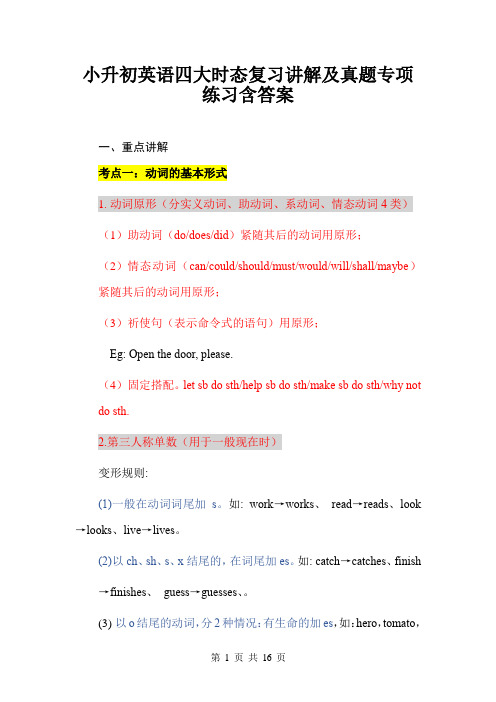
小升初英语四大时态复习讲解及真题专项练习含答案一、重点讲解考点一:动词的基本形式1.动词原形(分实义动词、助动词、系动词、情态动词4类)(1)助动词(do/does/did)紧随其后的动词用原形;(2)情态动词(can/could/should/must/would/will/shall/maybe)紧随其后的动词用原形;(3)祈使句(表示命令式的语句)用原形;Eg: Open the door, please.(4)固定搭配。
let sb do sth/help sb do sth/make sb do sth/why not do sth.2.第三人称单数(用于一般现在时)变形规则:(1)一般在动词词尾加s。
如: work→works、read→reads、look →looks、live→lives。
(2)以ch、sh、s、x结尾的,在词尾加es。
如: catch→catches、finish→finishes、guess→guesses、。
(3)以o结尾的动词,分2种情况:有生命的加es,如:hero,tomato,potato;没有生命的加s,如:radio,photo。
(4)以辅音字母加y结尾的动词,变y为ies。
如: fly→flies、study →studies、carry→carries.(5) 不规则变化。
如: have→has ,are→is,were→was3.现在分词(用于现在进行时)变形规则:(1)一般在动词后加ing。
如: work→working、read→reading、look →looking、wait→waiting。
(2)以不发音的e结尾的动词,去掉e,再加ing。
如: smile→smiling、move→moving、take→taking、write→writing。
(3)以重读闭音节结尾的且词尾只有一个辅音字母的,双写这个辅音字母加ing。
如: sit→sitting、stop→stopping、cut→cutting、run →running、swim→swimming.(4)少数几个以ie结尾的动词,将ie改为y加ing。
小学英语四大时态总结及练习题
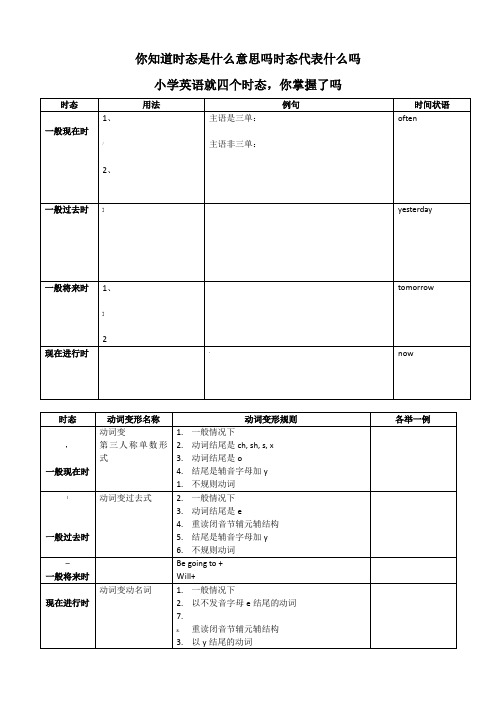
你知道时态是什么意思吗时态代表什么吗小学英语就四个时态,你掌握了吗你能发现它们之间的共同点和不同点吗勤加练习,百战不殆I.把下列动词变为第三人称单数形式。
1. clean--2. go--3. have--4.do-6. fly--7. come-- brush-9. watch-- 10. study-- 11. ask--(13. swim-- 14. catch-- 15. write--16. eat-- 17. make-- 18. paint—19. learn-- 20. phone-- 21. run—22. hop-- 23. sing-- 24. pick—II.把下列动词变成过去式is\am________ fly______ plant________are________ drink_________ play_______go________ make ______ does_________dance________ worry________ ask _____ taste_________ eat__________ draw________put ______ throw________kick_________ pass_______ do ________III.把下列动词变成动名词形式。
Wake________ make__________ come____________have____________!Take_________ leave__________ rid_________, regret__________, Begin________,cut________, get_________, hit_________, run_________, set_________, sit__________, spit__________, stop_________, swim________,beg_________, drop__________, fit_________, nod_________, dig___________, forget_________, travel_________visit_________Carry_________ enjoy___________ play ___________ study ________die_________ lie_________多加练习,百战不殆之时态篇一、用单词的正确形式填空:1.Mike _________ (do) his homework every day.2.There __________(be) some water in the glass.3.We like ________ (play) basketball after class.4.I like singing. I often _________(listen) to the music in the evening.5.【6.My grandma_________(watch) TV every day.二、判断句子的正误, 并改正。
小学英语四大时态总结及练习题

小学英语四大时态总结及练习题小学英语四大时态总结及练习题你知道时态是什么意思吗?时态代表什么吗?小学英语就四个时态,你掌握了吗?时态一般现在时1、2、1、2用法主语是三单:主语非三单:例句时间状语often一般过去时yesterday一般将来时tomorrow现在进行时now时态动词变形名称1.2.3.4.1.2.3.4.5.6.动词变形规则一般情况下动词结尾是ch,sh,s,x动词结尾是o结尾是辅音字母加y不规则动词一般情况下动词结尾是e重读闭音节辅元辅结构结尾是辅音字母加y不规则动词各举一例动词变第三人称单数形一般现在时式动词变过去式一般过去时一般将来时Begoingto+Will+1.2.7.3.4.一般情况下以不发音字母e结尾的动词重读闭音节辅元辅结构以y结尾的动词以ie结尾的动词动词变动名词现在进行时你能发现它们之间的共同点和不同点吗?勤加练习,百战不殆I.把下列动词变为第三人称单数形式。
1.clean--2.go--3.have--4.do-5.play--6.fly--e--brush-9.watch--10.study--11.ask--12.answer--13.swim--14.catch--15.write--16.eat--17.make--18.paint19.learn--20.phone--21.run22.hop--23.sing--24.pickII.把下列动词变成过去式is\\am________fly______plant________are________drink_________p lay_______go________make______does_________dance________worry_____ ___ask_____taste_________eat__________draw________put______throw________kick_________pass_______do________III.把下列动词变成动名词形式。
word完整版小升初四大时态及习题
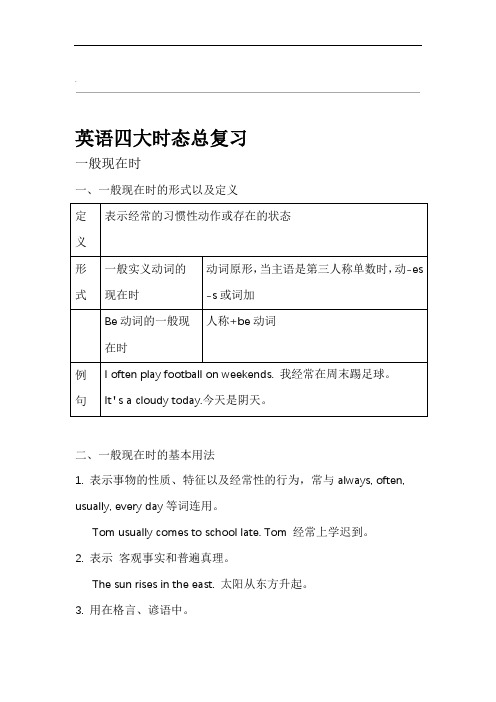
.英语四大时态总复习一般现在时一、一般现在时的形式以及定义二、一般现在时的基本用法1. 表示事物的性质、特征以及经常性的行为,常与always, often, usually, every day等词连用。
Tom usually comes to school late. Tom 经常上学迟到。
2. 表示客观事实和普遍真理。
The sun rises in the east. 太阳从东方升起。
3. 用在格言、谚语中。
No pains, no gains.不劳而获。
一般过去时一、一般过去时的定义以及形式..二、一般过去时的基本用法与常态,存作或在的状间表示在过去的时里发生的动1.等连用。
yesterday, last night, several years ago I took a bus to school last Friday.上周五我坐公交车去上学。
2. 表示在过去的某段时间里,经常或反复发生的动作或状态。
他们去年经常晚饭They had a walk after supper last year.后散步。
一般将来时一、一般将来时的定语以及形式二、一般将来时的基本用法常与将来的时间状语1. 表示将来某个时间要发生的动作或状态,tomorrow, next week等连用。
..She will be back tomorrow.她明天就回来。
2. 表示将来某一时间内经常发生的动作或状态。
We'll have a test every Monday this year. 今年的每一个周一我们都有考试。
巧学妙计Be going to 指当前已计划过或思考过的意图和打算;will/shall 表示未事先思考或未计划的意图。
Be going to 还可以表明马上要发生,而will则表明说话者的观点、主观意识。
I'm going to visit mu aunt this week. 我打算这周去看望姑姑。
(完整版)小升初英语总复习----四种时态专项训练(精编)
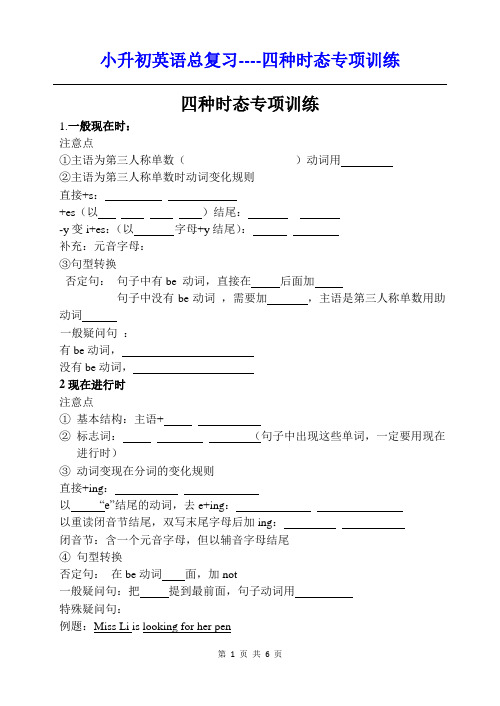
四种时态专项训练1.一般现在时:注意点①主语为第三人称单数()动词用②主语为第三人称单数时动词变化规则直接+s:+es(以)结尾:-y变i+es:(以字母+y结尾):补充:元音字母:③句型转换否定句:句子中有be 动词,直接在后面加句子中没有be动词,需要加,主语是第三人称单数用助动词一般疑问句:有be动词,没有be动词,2现在进行时注意点①基本结构:主语+②标志词:(句子中出现这些单词,一定要用现在进行时)③动词变现在分词的变化规则直接+ing:以“e”结尾的动词,去e+ing:以重读闭音节结尾,双写末尾字母后加ing:闭音节:含一个元音字母,但以辅音字母结尾④句型转换否定句:在be动词面,加not一般疑问句:把提到最前面,句子动词用特殊疑问句:例题:Miss Li is looking for her pen①②对①进行提问:对②进行提问:3一般过去时:注意点④句型转换否定句:主语+ (没有be动词)主语+ (有be动词)一般疑问句:以开头(没有be动词)以开头(有be动词)特殊疑问句:特殊疑问词+ + + ?(没有be动词)例题翻译:你家过去在哪里?4,一般将来时注意点①基本结构:主语+②标志词:next+年,月,日③句型转换:否定句:在be动词面加not他下周打算去公园吗?(一般疑问句)他下周打算去哪里?(特殊疑问句)④翻译:下周它将会是:_________ did you ________ the birds?2. Then, he let the boy go.(改为否定句)Then,he _______ ________ the boy go.3. They could play football.(改为一般疑问句,并作肯定回答)----________ they play football? ----Yes, they _________.4. Nancy lives in Nanjing now.(用last year 改写句子)Nancy _______ in Nanjing last year.5.I went to a shopping centre last Sunday.(改为一般疑问句,并作否定回答)---______ you ______ to a shopping centre last Sunday? ---No, I _________.6. He puts his things in order. (改为一般疑问句)___________________________________________________7. Did you go to bed late last night? (改为陈述句)____________________________________________________8. They often do their homework in the evening. (用she替换they)____________________________________________________9. You should put your books and toys on the floor. (改为否定句)_____________________________________________________10. He feels sleepy in the morning. (对划线部分提问)____________________________________________________11. This is Bobby’s bedroom. (对划线部分提问)____________________________________________________12. have, my, time, breakfast, I, always, on (.) (连词成句)____________________________________________________.13. The, out, the, get, lion, mouse, helped (.) (连词成句)____________________________________________________. 14. A monkey woke the tiger up.(改成一般疑问句)__________________________________________________15. Sam brings some water.(改成否定句)__________________________________________________16. Mike has some bread and milk for breakfast. (对划线部分提问)__________________________________________________17. The man sings well. (对划线部分提问)18. too, you, cola, much, drink, shouldn’t (.) (连词成句)______________________________________________________20 The children must play football on the road.(改为否定句)______________________________________________________ 21. We must look out for the traffic lights first.(对划线部分提问)______________________________________________________ 22. An old woman is crossing the road.(对划线部分提问)______________________________________________________ 23. You can’t watch TV now because it’s late. (对划线部分提问)______________________________________________________ 24. keep, desk, tidy, I, must, my, clean, and (.)(连词成句)______________________________________________________二用所给词的适当形式填空1.Let (we )(play) basketball this afternoon.2. (Be)your sister (visit) your parents tomorrow?3.Yang Ling is going to (make) clothes for her dolls.4. (child) Day is on the first of June.5. Tim usually (brush) his teeth in the morning.6.I (have) a birthday party last year.7.Tomorrow is Dragon Boat Festival. We (watch )a dragon boat race.8. They (eat) moon cakes last Mid-Autumn Festival?9.My parents ( watch) TV in the living room now.10. Your birthdayis coming. I (make) a cake for you.11.Let’s(play) the piano together.12.How many ( visit) are there in your group?13.My sister wants ( learn) about in England.14.My uncle is from ( Chinese).15.Animal ( love) will go to see them quickly.16.Jack (go )and look for his parents next week.17. (visit) from the US are very friendly.18.The girls ( learn) an English song next week.19.The students are very (excite).Because the game is very (e xcite).20.My mother likes ( listen)to music after dinner.21.He ( read) a book last night.22.Lucy is going to ( find) a book about e- cards.23.I (eat) some bread for breakfast yesterday.24.Can I ( have) an English book?25.We (are) twelve years old last year.26.I want (buy )a computer.27.What ( be) your parents going to do this weekend?28.We (fly) kites tomorrow.29.The boy ( come) to my house the day after tomorrow.30.What about (go )for a picnic next week?31. Mary’s birthday is next Monday, her mother (give) her a present.32.My mother ( buy) some snacks and drinks this morning.33. (Be) your family going to climb the hill next Sunday?34.Now, Bobby ( wear) his new clothes.35.This lesson (end) at half past eleven. Then you can have lunch.35. It is very cold these days . It (snow) tomorrow.36.-- You ( come here again next Saturday?---No. I (visit) my teacher.37.Hurry up! or we (be )late.38.--What you ( do) tomorrow afternoon?--I (see )a film with my friend.39.---Can you come and ( help )me with my English ,mum?。
小学四种时态试题及答案

小学四种时态试题及答案一、一般现在时1. 我每天上学。
A. go to schoolB. goes to schoolC. am going to schoolD. am going to go to school答案:A2. 他经常帮助别人。
A. He often help others.B. He often helps others.C. He often helped others.D. He often helping others.答案:B3. 我们喜欢游泳。
A. We like to swim.B. We likes to swim.C. We liked to swim.D. We liking to swim.答案:A二、一般过去时4. 昨天我去了图书馆。
A. I go to the library yesterday.B. I went to the library yesterday.C. I am going to the library yesterday.D. I go to the library yesterday.答案:B5. 他们上周看了电影。
A. They watch a movie last week.B. They watched a movie last week.C. They are watching a movie last week.D. They will watch a movie last week.答案:B6. 她昨天买了一本书。
A. She buy a book yesterday.B. She bought a book yesterday.C. She is buying a book yesterday.D. She will buy a book yesterday.答案:B三、一般将来时7. 明天我要去看医生。
A. I am going to see a doctor tomorrow.B. I go to see a doctor tomorrow.C. I went to see a doctor tomorrow.D. I will go to see a doctor tomorrow.答案:A8. 他们将要参加比赛。
小升初四大时态及习题(2021年整理)

小升初四大时态及习题(word版可编辑修改)编辑整理:尊敬的读者朋友们:这里是精品文档编辑中心,本文档内容是由我和我的同事精心编辑整理后发布的,发布之前我们对文中内容进行仔细校对,但是难免会有疏漏的地方,但是任然希望(小升初四大时态及习题(word 版可编辑修改))的内容能够给您的工作和学习带来便利。
同时也真诚的希望收到您的建议和反馈,这将是我们进步的源泉,前进的动力。
本文可编辑可修改,如果觉得对您有帮助请收藏以便随时查阅,最后祝您生活愉快业绩进步,以下为小升初四大时态及习题(word版可编辑修改)的全部内容。
英语四大时态总复习一般现在时一、一般现在时的形式以及定义二、一般现在时的基本用法1。
表示事物的性质、特征以及经常性的行为,常与always, often, usually, every day等词连用.Tom usually comes to school late. Tom 经常上学迟到。
2. 表示客观事实和普遍真理。
The sun rises in the east. 太阳从东方升起。
3. 用在格言、谚语中。
No pains, no gains。
不劳而获.一般过去时一、一般过去时的定义以及形式二、一般过去时的基本用法1. 表示在过去的时间里发生的动作或存在的状态,常与yesterday, last night , several years ago 等连用。
I took a bus to school last Friday.上周五我坐公交车去上学.2.表示在过去的某段时间里,经常或反复发生的动作或状态。
They had a walk after supper last year. 他们去年经常晚饭后散步。
一般将来时一、一般将来时的定语以及形式二、一般将来时的基本用法1. 表示将来某个时间要发生的动作或状态,常与将来的时间状语tomorrow , next week 等连用。
She will be back tomorrow 。
小学英语四种时态的综合讲解及练习

一般将来时:定义:一般将来时表示将来某一时刻的动作或状态,或将来某一段时间内经常的动作或状态。
构成:(1)be going to + 动词原形(2)will/shall + do用法:1)表示将来的动作或状态一般将来时常与一些表示将来的时间状语连用,如:tomorrow(明天),next week(下周),from nowon(从现在开始);in the future(将来);someday (未来的某一天) 等。
2)表示将来经常发生的动作I’ll teach you English every Wednesday next month.★★★“be going to+动词原形”表示即将发生的或最近打算进行的事。
例如:①It is going to rain. 要下雨了。
②We are going to have a meeting today. 今天我们开会。
Step Three: Do Some Exercise一、用will 或will not 以及括号中的动词完成句子1、I a Chinese song.(sing)2、Sally the tennis match.(not win)3、You the one-day trip to Guangzhou.(enjoy)4、Flora at home this weekend.(not stay)二、用括号内的词和be going to 完成问答1、(when/we/ have dinner? We / it / at seven o’clock)A When are we going to have dinner?B We are going to have it at seven o’clock.2、(Where / you /meet your friends? We / them /at the school gate)AB3、(you and Ling / play football/ today? No / we/ table tennis)AB现在进行时be+动词ing。
(完整版)小学英语时态总结及练习题终版【精】
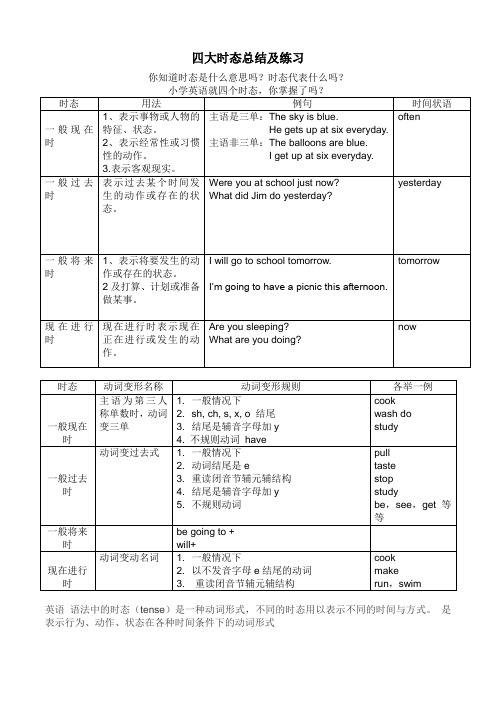
四大时态总结及练习你知道时态是什么意思吗?时态代表什么吗?英语语法中的时态(tense)是一种动词形式,不同的时态用以表示不同的时间与方式。
是表示行为、动作、状态在各种时间条件下的动词形式多加练习,百战不殆之时态一、选择最佳的答案:1.____Alice often play the piano? No, she _____.A. Do; doB. Does; doesC. Does; doesn't2.___ your penpal __ in Beijing?A. Do; liveB. Do; livesC. Does; live3. Tom and Mike __ very excited, they will take a trip.A. isB. areC. am4.I like ________ very much. What about you?A. danceB. dancedC. dancing5.The kite ____ a bird.A. look likeB. is lookingC. looks like6.Bill and I ___ good friends.A. isB. areC. am7.Sandy often ___ his homework on Sundays .A. doB. doesC. did8. What do you usually do on the weekend? I __________.A. went swimmingB. go swimmingC. visited grandparents9.What do you usually do on your holiday? I usually __________.A. saw elephantsB. sing and danceC.took picture10.I ____ a student. I go to school ____bus every day.A. is; byB. am; onC. am; by11.I ____ a brother. She ____ a sister.A. have; hasB. has; hasC. have; have12.You ____ a student. He ____ a teacher.A. is; isB. are; isC. are; are13.He always _____ football games.A. watchesB. watchC. doesn't14.My best friend _____ shells.A. collectsB. collectC. often15.She doesn’t _____ listening to the music.A. oftenB. likeC. likes16.My mother and I ___ always watch romantic films.A. doesn’tB. don’tC. do17.---When _____ he usually get home on Friday?----He usually gets home at four on Friday.A. doB. doesC. did18,.Summer _________ spring.A. comes afterB. comes ines before19.Every one ____ to their teacher in the classroom.A.are listeningB. is listeningC. listen20.They are singing and ___ together at the party now.A. danceB. dancedC. dancing21. Listen! The birds ____.A. is singingB. are singC. are singing22.Look! The kite ___ in the sky.A. flyB. fliesC. is flying23.They ____ riding a forse.A. isB. areC. am24.Kate ____ playing chess.A. amB. isC. are25.Are you washing clothes?A. Yes, you areB. Yes, I amC. No, I am26.Is he ____ TV?Yes, he is.A. watchB. watchingC. not27.____ they taking pictures.? Yes, they are.A. AmB. BeC. Are28.It’s 10 o’clock. Ben _____ TV in the bedroom.A. watchB. is watchingC. watches29.I ___presents for my parents yesterday.A. buyedB. boughtC. buying30. Susan _____ swimming yesterday.A. goB. goesC. went31. Danny _____ breakfast five times last week.A.eatB. ateC. eatedst Sunday____ Tree Planting Day.A. isB. wereC. was33.I ____ a lot from our textbook.A. learnedB. learnesC. learning34.We ____ to the zoo and ___ a lot of animals yesterday.A. go; seeB. went; sawC. goes; sees35.What did you do last weekend ? --I _________A. read a bookB. wash the clothesC. go fishing36.What did you do on your holiday? I ________A. bought a presentB. go skiingC. learn English37.What did he _____ yesterday? He ____ his homework.A. did; didB. do; didC. do; do38.Yesterday my presents and I ____ our house.A. were cleaningB. cleanedC. are going to clean39.What _____ to trees in the different seasons?A. happenB. happensC. happenedst summer. I ____ in the lake and played on the beach.A. swimB. swamC. will swim41. Did you eat good food in China? ______.A. Yes, I doB. No, I didn’tC. No, I did42.We played basketball _____.A. sometimesB. on SaturdaysC. last Saturday43.I’m going to ___ some chopsticks ___ Sunday afternoon.A. bought; onB. buy; onC. buy; on44.When are you going to Hong Kong? I’m going there ____ .A. this weekendB. by planeC. yesterday45.I’m going to____ my friends this weekend.A. visitB. visitedC. visiting46.I’m going to____ homework tomorrow.A. doesB. doC. did47.Are you going to take a piano class? ____A. No, we notB. No, I amC. Yes, I am48.I am ___ eat breakfast at 7:15.A. willB. going toC. shall49.We are going to ____ to the park tomorrow.A. goB. goesC. going50.What film are you going to ______ ?A. seeB. watchC. look51.We _____ a play tomorrow. Will you please join us?A. are going to seeB. sawC. sees52.He ___ a race with Ming Ming.A. shall haveB. will haveC. going to have53.Where _____ you go tomorrow?A. areB. willC. shall54.___ his brother going to climb mountains?A. IsB. AreC. Am55.Look! It _____.A. will snowingB. is going to snowC. snows56.I ____ free this afternoon.A. beB. will beC. going to be57.They will ____ roast ducks in Beijing.A.ateB. eatsC. eat58.I __ visit my friends this weekend.A. go toB. am going toC. going to二、按照要求改写句子1. Daniel watches TV every evening.(改为否定句)___________________________________________________2. I do my homework every day.(改为一般疑问句,作否定回答)________________________________________________________ 3. She likes milk.(改为一般疑问句,作肯定回答)___________________________4. Amy likes playing computer games.(改为一般疑问句,作否定回答) ___________________________________________________5. I like taking photos in the park.(对划线部分提问)________________________________________________________ 6. John comes from Canada.(对划线部分提问)___________________________________________________7.Nancy is going to go camping.(改否定)Nancy ________ going to go camping.1. I’ll go and join them.(改否定)I _______ go ______ join them.2. I’m going to get up at 6:30 tomorrow.(改一般疑问句)________ _______ ________ to get up at 6:30 tomorrow?3. We will meet at the bus stop at 10:30.(改一般疑问句)_______ ________ meet at the bus stop at 10:30.4. She is going to listen to music after school.(对划线部分提问)________ _______ she ________ ________ _________ after school?5. My father and mother are going to see a play the day after tomorrow.(同上) _________ _________ going to see a play the day after tomorrow.1. There was a car in front of the house just now.否定句:________________________________________________一般疑问句:____________________________________________肯、否定回答:__________________________________________肯、否定回答:__________________________________________一.按要求改写句子2. The boy is playing basketball.否定句:____________________________一般疑问句:_________________________肯定回答:__________________________否定回答:__________________________对“is playing basketball”提问:__________________________对“ The boy”提问:__________________________3. They are singing in the classroom.否定句:____________________________一般疑问句:_________________________肯定回答:__________________________否定回答:__________________________对“are singing ”提问:__________________________对“ in the classroom”提问:__________________________三、用括号内动词的适当形式填空。
小学英语时态总结及练习题终版【精】

A. did; did B. do; did C. do; do
38.Yesterday my presents and I ____ our house.
A. were cleaning B. cleaned C. are going to clean
39.What _____ to trees in the different seasons?
A. visit B. visited C. visiting
46.I ’m going to____ homework tomorrow.
3欢迎。下载
精品文档
A. does B. do C. did
47.Are you going to take a piano class? ____
A. No, we not B. No, I am C. Yes, I am
一 般 将 来 1、表示将要发生的动 I will go to school tomorrow.
tomorrow
时
作或存在的状态。
2 及打算、计划或准备 I ’m going to have a picnic this
做某事。
afternoon.
现 在 进 行 现在进行时表示现在 Are you sleeping?
精品文档
四大时态总结及练习
你知道时态是什么意思吗?时态代表什么吗?
小学英语就四个时态,你掌握了吗?
时态
用法
例句
时间状语
1、表示事物或人物的 主语是三单: The sky is blue.
often
一 般 现 在 特征、状态。
He
gets up at six
时
2、表示经常性或习惯 everyday.
小学英语四大时态总结计划附小升初时态考题专享
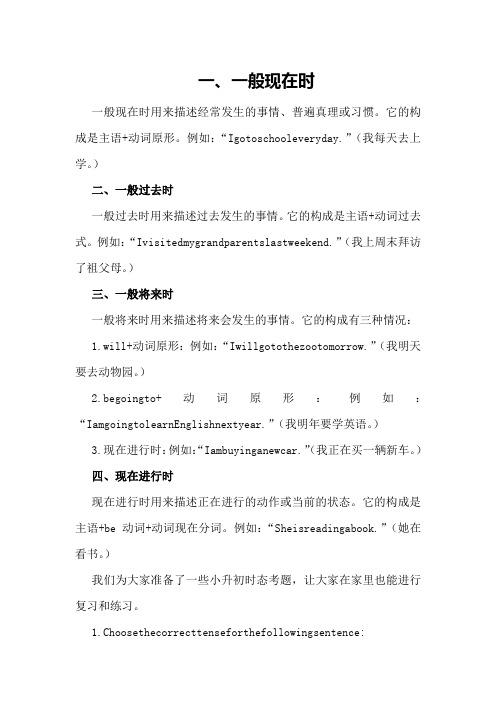
一、一般现在时一般现在时用来描述经常发生的事情、普遍真理或习惯。
它的构成是主语+动词原形。
例如:“Igotoschooleveryday.”(我每天去上学。
)二、一般过去时一般过去时用来描述过去发生的事情。
它的构成是主语+动词过去式。
例如:“Ivisitedmygrandparentslastweekend.”(我上周末拜访了祖父母。
)三、一般将来时一般将来时用来描述将来会发生的事情。
它的构成有三种情况:1.will+动词原形:例如:“Iwillgotothezootomorrow.”(我明天要去动物园。
)2.begoingto+动词原形:例如:“IamgoingtolearnEnglishnextyear.”(我明年要学英语。
)3.现在进行时:例如:“Iambuyinganewcar.”(我正在买一辆新车。
)四、现在进行时现在进行时用来描述正在进行的动作或当前的状态。
它的构成是主语+be动词+动词现在分词。
例如:“Sheisreadingabook.”(她在看书。
)我们为大家准备了一些小升初时态考题,让大家在家里也能进行复习和练习。
1.Choosethecorrecttenseforthefollowingsentence:a.I(go)totheparkeveryweekend.b.She(visit)hergrandparentslastweek.c.We(willvisit)themuseumtomorrow.d.They(areplaying)soccernow.2.Fillintheblankwiththecorrecttenseoftheverb:a.Mymother(cook)deliciousfoodeveryday.b.I(watch)TVlastnight.c.She(do)herhomeworknow.d.They(go)tothebeachinsummer.3.TranslatethefollowingsentencesintoEnglish:a.我每天刷牙。
小学英语小升初《四大时态》专项练习和答案(分别编排)

小升初英语四大时态专项练习班级考号姓名总分一、一般现在时一、写出下列动词的第三人称单数形式。
eat read do take washwatch have carry study f lycatch go have cook looksing teach like get come play二、用单词的正确形式填空:1. Mike ___________ (do) his homework every day.2. There ____________ (be) some water in the glass.3. We like ____________ (play) basketball after class.4. I like singing. I often ____________ (listen) to the music in the evening.5. My grandma ___________ (watch) TV every day.三、选择最佳的答案:1. ____Alice often play the piano. No, she _____.A. Do; doB. Does; doesC. Does; doesn\\\\'t2. ___ your penfriend __ in Beijing?A. Do; liveB. Do; livesC. Does; live3. Tom and Mike __ very excited, they will take a trip.A. isB. areC. am4. I like ________ very much. What about you?A. danceB. dancedC. dancing5. I can’t find my pen. Let me __.A. go and ask herB. go and ask hersC. go and ask she6. Fangfang is a good student. She ____maths.A. does good atB. well do itC. is good at7. The kite ____ a bird. A. look like B. is looking C. looks like8. Bill and I ___ good friends.A. isB. areC. am9. Sandy often ___ his homework on Sundays .A. doB. doesC. did10. What do you usually do on the weekend? I __________.A. went swimmingB. go swimmingC. visited grandparents11. What do you usually do on your holiday?A. saw elephantsB. sing and danceC.took picture12. I ____ a student. I go to school ____bus every day.A. is; byB. am; onC. am; by13. I ____ a brother. She ____ a sister.A. have; hasB. has; hasC. have; have14. You ____ a student. He ____ a teacher.A. is; isB. are; isC. are; are15. He always _____ football games.A. watchesB. watchC. doesn\\\\'t16. My best friend _____ shells.A. collectsB. collectC. often17. She doesn’t _____ listening to the music.A. oftenB. likeC. likes18. My mother and I ___ always watch romantic films.A. doesn’tB. don’tC. do19. ---When _____ he get home on Friday?----He gets home at four on Friday.A. doB. doesC. did二、现在进行时一、写出下列单词的现在分词:do play dance sitmake swim jump cookclean watch come readeat write sing gorun fly catch help二、用单词的适当形式填空:1. look! Chen Jie and Mike are ___________(sing)now.2. The small bear is ________ (climb) the tree.3. Mike is ________ (draw) picture.4. She is ________ (do) the dishes.5. My brother is ________ (make) kites.6. My father is ________ (read) a newspaper in living room.7. Ted is __________(answer) the phone.8. My uncle is ________ (drive) a car.9. The students are ________(listen) to their teacher carefully.10. Chen Jie is _________(wash) clothes.三、选择正确答案1. Every one ____ to their teacher in the classroom.A. are listeningB. is listeningC. listen2. They are singing and ___ together at the party now.A. danceB. dancedC. dancing3. Listen! The birds ____.A. is singingB. are singC. are singing4. Look! The kite ___ in the sky. A. fly B. flies C. is flying5. They ____ riding a forse. A. is B. are C. am6. Kate ____ playing chess. A. am B. is C. are7. Are you washing clothes?A. Yes, you areB. Yes, I amC. No, I am8. Is he ____ TV?Yes, he is. A. watch B. watching C. not9. ____ they taking pictures.? Yes, they are.A. AmB. BeC. Are10. It’s 10 o’clock. Ben _____ TV in the bedroom.A. watchB. is watchingC. watches四、根据中文填空。
(完整版)小学英语四种时态知识点加练习(最新整理)

小学英语四种时态知识点加练习一、一般现在时一. 意义:表示经常发生的事情,动作或存在的状态二. 构成及变化1.b e 动词的变化。
肯定句:主语+be(am,is,are)+其它。
如:I am a boy.我是一个男孩。
否定句:主语+ be + not +其它。
如:He is not a worker.他不是工人。
一般疑问句:Be +主语+其它。
如:-Are you a student? -Yes. I am. / No, I'm not.特殊疑问句:疑问词+一般疑问句。
如:Where is my bike?2.行为动词的变化。
l、当主语为第一,二人称及复数时,助动词为do肯定句:主语+动词原形(+其它)。
如:We often play basketball after school.否定句:主语+ don't+动词原形(+其它)。
如:we don’t play basketball after school.一般疑问句:Do +主语+动词原形+其它?如:Do you often play basketball after school? Yes, we do. / No, we don't.特殊疑问句:疑问词+以do 开头的一般疑问句?如:What do you often do after school ?2、当主语为第三人称单数时,助动词为does肯定句:主语+动词三单式(+其它)。
如:He swims well.否定句:主语+ doesn’t+动词原形(+其它)。
如:He doesn’t swim well..一般疑问句:Does +主语+动词原形+其它。
如:Does he swim well ?Yes, he does. / No, he doesn't.特殊疑问句:疑问词+以does 开头的一般疑问句?如:How does your father go to work?三.第三人称单数的动词变化规则(只有在第三人称为主语的肯定句中,动词才用三单式)(1)多数动词直接加s: runs gets likes collets takes plays climbs…….(2)结尾是s, x, sh, ch, o,前为辅音字母, 结尾加es : watches teaches goes does washes crosses mixes brushes(3)动词末尾y 前为辅音:将y 改为i 加es: study→studies fly→flies carry→carries cry→cries但在y 前如果为元音则直接加s: buys says四.时间标志:always , usually , often , sometimes ,every…一般现在时练习题I.用下列单词的适当形式填空1.We often (play) in the playground.2.He (get) up at six o’clock.3.you (brush) your teeth every morning?4.What (do) he usually (do) after school?5.Danny (study) English, Chinese, maths, science and Art at school.6.Mike sometimes (go) to the park with his sister.7.A t eight at night, she (watch) TV with his parents.8.Mike (read) English every day?9.How many lessons your classmates (have) on Monday?10.What time his mother (do) the housework?II.改句子1.D o you often play football after school? (改为肯定句)2.I have many books.(改为否定句)3.G ao Shan’s sister likes playing table tennis (改为否定句)4.S he lives in a small town near New York.(改为一般疑问句)5.I watch TV every day.(改为一般疑问句)6.We have four lessons.(改为否定句)7.Nancy doesn’t run fast (改为肯定句)二、现在进行时一、概念现在进行时表示说话时正在进行或发生的动作,也可表示当前一段时间内的活动或现阶段正在进行的动作。
小学英语四大时态总结(附小升初时态考题)上课讲义

butterfly-butterfliesfamily-families4. 以o结尾的单词: 有生命加s 。
tomato-tomatoespotato-potatoes无生命加espiano-pianosphoto-photoszoo-zoosradio-radios小升初时态专题综合训练1.(成都市青羊区小学毕业卷)John _____ football.A. likes playingB. likes playC. like play2.(深圳市龙岗区小学毕业卷)Does your mother _____ football?A. likeB. likesC. like play3.(芜湖市第三中学招生卷)They usually _____ TV in the evening.A. watchB. will watchC. are watchingD. watches4.(上海市奉贤区小学毕业卷)—What do you usually do on the weekend?—I often ____.A. do my homeworkB. did my homeworkC. doing my homework5. (杭州市西湖区小学毕业卷)I don’t like _____ thril lers(恐怖片)______ playing baseball.A. watching; orB. watching; andC. to watch; or6.(菏泽市晨曦中学招生卷)Bob often _____ to school.A. walkB. walksC. walked7.(南昌铁路一中初中部招生卷)My pen ______ on my desk ten minutes ago.But it _____ there now.A. is; isn’tB. was; isn’tC. is; is8.(长沙市宁乡县小学毕业卷)Mike is _____ after his classmates.A. runsB. runingC. running9.(桂林市奎光学校招生卷)Be quiet! The babies ________.A. sleepB. are sleepingC. slept10. (武汉市青山区小学毕业卷)______ he _____ his homework yesterday?A. Does; doB. Did; didC. Did; do11(北京市朝阳区小学毕业卷)—What did you do last weekend?—I ______.A. go swimmingB. did my homeworkC. went swim12.(芜湖市第十一中学招生卷)—What’s your hobby?—_____ is my hobby.A. Collecting stampsB. Collect stampsC. Stamps13.(广州市白云区小学毕业卷)—Where were you just now?—I _____ at school.A. isB. wasC. were14.(武汉市青山区小学毕业卷)______ he ______ his grandparents lastmonth?A. Did; visitedB. Did; visitC. Do; visited15.(郑州市二七区小学毕业卷)Last week, we _____ a _____ race.A. hard; runningB. have; runningC. had; running16.(福州市仓山区小学毕业卷)I______ to the park last week.A. goB. wentC. going17.(合肥市蜀山区小学毕业卷)If I _____ you tomorrow, I will give youthe receipt(收据)。
小升初英语四大时态总结

小升初英语四大时态总结
小学生必须掌握的四种时态
一般现在时:用于表示重复的动作、状态或真理,常见的时间状语有always、often、usually、sometimes、never、everyday、once a week、twice a month、last holiday、two days ago、yesterday、just now、this morning等。
当主语为第三人称单数时,动词要加上-s或-es,例如he likes,XXX。
一般过去时:用于讲故事或表示过去经常发生的事情。
常见的时间状语有last week、yesterday、two days ago等。
动词
的过去式有规律变化和不规律变化,规律变化包括加-ed、去e 加-d、变y为i加-ed、双写加-ed,不规则变化则需要记忆。
现在进行时:用于表示正在进行的动作或即将发生的动作,常见的时间状语有now、look、listen、at the moment、at this time等。
构成方式是先写出与主语相应的be动词,再给动词
加上-ing形式。
将来时:用于表示将来要发生的动作,常见的时间状语有next Sunday、in two hours、tomorrow、this evening等。
构成方式是先写will或be going to,再加上动词原形。
以上四种时态是小学生必须掌握的基本语法,需要根据不同的时间状语和主语形式进行相应的动词变化。
- 1、下载文档前请自行甄别文档内容的完整性,平台不提供额外的编辑、内容补充、找答案等附加服务。
- 2、"仅部分预览"的文档,不可在线预览部分如存在完整性等问题,可反馈申请退款(可完整预览的文档不适用该条件!)。
- 3、如文档侵犯您的权益,请联系客服反馈,我们会尽快为您处理(人工客服工作时间:9:00-18:30)。
3. 以辅音字母+y结尾的单词,变y为i,再加es。
butterfly-butterfliesfamily-families4. 以o结尾的单词: 有生命加s 。
tomato-tomatoespotato-potatoes无生命加espiano-pianosphoto-photoszoo-zoosradio-radios小升初时态专题综合训练1.(成都市青羊区小学毕业卷)John _____ football.A. likes playingB. likes playC. like play2.(深圳市龙岗区小学毕业卷)Does your mother _____ football?A. likeB. likesC. like play3.(芜湖市第三中学招生卷)They usually _____ TV in the evening.A. watchB. will watchC. are watchingD. watches4.(上海市奉贤区小学毕业卷)—What do you usually do on the weekend?—I often ____.A. do my homeworkB. did my homeworkC. doing my homework5. (杭州市西湖区小学毕业卷)I don’t like _____ thri llers(恐怖片)______ playing baseball.A. watching; orB. watching; andC. to watch; or6.(菏泽市晨曦中学招生卷)Bob often _____ to school.A. walkB. walksC. walked7.(南昌铁路一中初中部招生卷)My pen ______ on my desk ten minutes ago.But it _____ there now.A. is; isn’tB. was; isn’tC. is; is8.(长沙市宁乡县小学毕业卷)Mike is _____ after his classmates.A. runsB. runingC. running9.(桂林市奎光学校招生卷)Be quiet! The babies ________.A. sleepB. are sleepingC. slept10. (武汉市青山区小学毕业卷)______ he _____ his homework yesterday?A. Does; doB. Did; didC. Did; do11(北京市朝阳区小学毕业卷)—What did you do last weekend?—I ______.A. go swimmingB. did my homeworkC. went swim12.(芜湖市第十一中学招生卷)—What’s your hobby?—_____ is my hobby.A. Collecting stampsB. Collect stampsC. Stamps13.(广州市白云区小学毕业卷)—Where were you just now?—I _____ at school.A. isB. wasC. were14.(武汉市青山区小学毕业卷)______ he ______ his grandparents lastmonth?A. Did; visitedB. Did; visitC. Do; visited15.(郑州市二七区小学毕业卷)Last week, we _____ a _____ race.A. hard; runningB. have; runningC. had; running16.(福州市仓山区小学毕业卷)I______ to the park last week.A. goB. wentC. going17.(合肥市蜀山区小学毕业卷)If I _____ you tomorrow, I will give youthe receipt(收据)。
A. seeB. will seeC. am seeing18.(无锡市北塘区小学毕业卷)She ______ English in a school.A. teachB. teachesC. teaching19.(上海市虹口区小学毕业卷)Christmas ______.A. are comingB. is comeingC. is comingD. comes20.(鞍山市铁西区小学毕业卷)_______ Li Ming taller than Gao Shan ten yearsago?A. IsB. WasC. DoesD.Did21.(邯郸市魏县小学毕业卷)She _____ from China.A. comeB. comesC. comingD. is come22.(石家庄市新乐市小学毕业卷)How ____ he _______ to school?A. does; getB. do; getC. does; getD. do; gets二、(邯郸市复兴区小学毕业卷)动词填空。
1. It ______ ( be) seven o’clock in the evening now.2. —What _____ Kevin _____ (do) on weekends?—He sometimes _______ (clean) his room.Sometimes he _____ (wash) his clothes.3. Jeff ____ (like) _____( live) in China very much.He ____ (say) China is great.4. Listen! The girl _____ ______ (sing)now.She often ______ (sing) at this time of a day.三、(天津市北辰区小学毕业卷)连词成句。
1. books, they, some, are, reading (.)______________________________2. usually, we, have, 12:30, at, lunch(.)______________________________3. go, school, I, my, car, often, to, father’s, in (.)______________________________参考答案一、1. A 【解析】like doing sth.喜欢做某事。
主语为第三人称,谓语动词用第三人称单数。
2. A【解析】助动词引导的疑问句后面的动词用原形。
3. A【解析】频度副词usually表示的是经常性发生的动作,用一般现在时。
4. A【解析】频度副词often表示的是经常性发生的动作,用一般现在时。
5. A 【解析】like doing sth.喜欢做某事,don’t like doing sth.不喜欢做某事;watching thrillers 和playing baseball是并列短语,前面否定了两者,所以连词用or。
6. B【解析】频度副词often表示的是经常性发生的动作,与一般现在时连用。
主语为第三人称,谓语动词用第三人称单数。
7. B【解析】时间状语ten minutes ago,表示的是过去发生的事情,谓语动词用一般过去时。
now表示现在。
8. C【解析】句意:迈克正跑在同学们身后。
9. B 【解析】babies为复数名词,谓语动词用are。
be doing正在做某事。
10. C【解析】由时间状语yesterday可知,句子的时态为过去时态。
do homework 为固定搭配。
11. B【解析】问句问的是上周做了什么,答句回答的应是过去做的事情,用一般过去时。
12. A【解析】动词的ing形式做主语。
13. B【解析】 just now “刚刚”,是已经过去的时间段,在过去的时间段里做的事情,应用一般过去时态。
14. B【解析】句意:他上个月拜访了他的祖父母吗?15. A【解析】由时间状语last week可知,谓语动词应用一般过去式。
running race 为固定搭配。
16. B 【解析】last week “上周”,上周做的事情是过去发生的动作。
17. A【解析】 if引导的条件状语从句,主句用将来时,从句用一般现在时。
18. B【解析】句意:她在学校教英语。
这是一个客观事实,应用—般现在时。
主语为第三人称,谓语动词用第三人称单数。
19. C【解析】句意:圣诞节就要来了。
现在进行时表将来。
20. B【解析】由three years ago可知,这里问的是三年前的状态,用一般过去时。
be taller than比……高。
21. B【解析】句意:她来自中国。
22. A.【解析】主语为第三人称he,助动词用第三人称单数,动词短语用原形。
三、1. is【解析】由now可知,句意为“现在正是晚上7点2. does; do; cleans; washes 【解析】sometimes 为频度副词,表示经常性发生的动作,用一般现在时。
3. likes; living; 【解析】says like doing sth 喜欢做某事,主语为第三人称单数,主谓一致。
4. is singing; sings【解析】第一个句子讲的是“她正在唱歌”。
第二个句子为“她经常在一天中的这个时候唱歌。
”四、1. They are reading some books.句意:他们正在读书。
2. We usually have lunch at 12:30.句意:我们经常12:30吃午饭。
3. I often go to school in my father’s car.句意:我经常坐我爸爸的车去学校。
